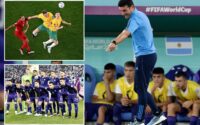Inside Sinead Farrelly’s Gotham FC comeback after NWSL abuse
Sinead Farrelly stood at the touchline at Red Bull Arena in March, and surveyed the field.
It had been seven years since she last played a professional soccer game, and Farrelly — after going public about the traumatic abuse she faced as a player in the National Women’s Soccer League and becoming a catalyst for change in the league — was ready to prove to herself she could make the comeback of a lifetime.
“I don’t know how I got into the mindset I did, because I just felt free and confident,” Farrelly told The Post in a recent sitdown interview. “I told myself the second I got on the field, I needed to go touch the ball, because If I don’t, I’m going to be in my head.”
Farrelly subbed in for NJ/NY Gotham FC at the 70th minute to a standing ovation, and within seconds was on the ball. With her first touches, it seemed like the midfielder had never missed a day, let alone nearly a decade.
Although Gotham didn’t win that day, Farrelly’s personal triumph trumped the scoreboard.
“I felt that heaviness of losing,” Farrelly recalled. “But I was on such a high because I played and I didn’t suck.”

Farrelly’s inspiring comeback now has been recognized on an international level.
In April, she made her debut for Ireland, her father’s home country and a place where the dual citizen spent much of her childhood. “I was hesitant about it at first because I was questioning if I could even play at a club level,” Farrelly said.
And Farrelly will represent Ireland in the country’s first appearance in the FIFA Women’s World Cup, starting Thursday in Australia and New Zealand.
In 2021, Farrelly came forward with her former teammate Mana Shim and accused former Portland Thorns coach Paul Riley of harassment in a story published by The Athletic. The players described a pattern of abuse by the coach that had remained uninvestigated despite attempts to inform the team and the league about the alleged behavior.
Farrelly described how over the course of her professional career, Riley expressed inappropriate interest in her personal life, engaged in sexual coercion and exploited the power dynamic of coach and player in such a way that it led to panic attacks and daydreams about getting injured so she could escape having to play for him.
She said Riley’s pernicious influence even led her to turn down a callup to the U.S. Women’s National Team prior to the 2011 FIFA Women’s World Cup.
“I felt under his control,” she told The Athletic.

The abuse she endured took a mental and physical toll. Following a trade from Portland to the Boston Breakers during the 2015 offseason, Farrelly suffered a concussion in a car accident and sat out the 2016 season. At that point, she decided to cut her soccer career short.
The shocking allegations shared by Farrelly and others in 2021 led to multiple investigations and sweeping changes within the NWSL. (Riley, by then with the North Carolina Courage, was fired following the article’s publication, and in 2023, was banned from the NWSL for life.)
While the NWSL grappled with the revelations and began to implement much needed change to protect players from abuse and harassment — including the adoption of the league’s first Collective Bargaining Agreement — Farrelly was in the midst of her own reinvention.
“That was such a heaviness on me that I couldn’t come back with that still inside of me. I realized I had to try now. I would regret it if I didn’t, even though it was really scary.”
Sinead Farrelly
“I knew I had to give up soccer when I retired, but it always lingered. I never gave myself the space to acknowledge that because I convinced myself it was never possible,” Farrelly said. “It was never a possibility for me until I came out with my story as well. That was such a heaviness on me that I couldn’t come back with that still inside of me.
“I realized I had to try now. I would regret it if I didn’t, even though it was really scary.”
So last summer at the age of 32, she quit her job in California, moved back home to Pennsylvania and began the comeback of a lifetime.
“This journey has been difficult, hard, joyous, fun, and rewarding, but I wouldn’t have chosen any other path. It’s a reflection of life,” she said. “It’s been way bigger than soccer.”
While Farrelly’s path back to soccer was difficult physically and emotionally, her decision to rejoin the NWSL also was complex.
Steve Swanson, her former college coach at the University of Virginia, connected Farrelly with Gotham general manager and former player Yael Averbuch West.
“She was willing to come let me try out and give me that chance,” Farrelly said.

Having hardly worked out since her retirement, regaining the proper fitness level was a rude awakening for Farrelly. After some weight training, she started playing pickup games with a group of older men and regained the happiness she felt around the game that she loved. After an initial injury setback, Farrelly hired a soccer trainer who worked with Major League Soccer’s Philadelphia Union.
“He changed my perspective. I started off walking on an incline on a treadmill and didn’t touch a ball again until December,” Farrelly said. “I needed to set a foundation.”
Eventually, she started playing once a week, then twice a week, before getting the chance to attend Gotham’s preseason.
Joining any NWSL club was a daunting prospect for Farrelly after the league had caused her so much pain, but something about Gotham felt different.
“The thing about Gotham for me was the people. I originally didn’t want to come to the NWSL. I didn’t want the attention around it, and thought that level was too high for me,” Farrelly said. “After speaking with Yael and knowing the players on Gotham like Michelle Betos and McCall Zerboni, those are my people — they’ve been with me through my life and soccer journey. I just knew I needed safety and to feel comfortable to be myself.”
Betos’ and Zerboni’s histories with Farrelly date back many years, including playing with her on the Portland Thorns in 2015. Betos said she is not surprised to see how quickly Farrelly has reacclimated to physical demands of the professional game, even though the path back was difficult.

“Selfishly, I wanted her to come here, but I knew it was going to be a tough transition,” Betos said. “She had been out seven years, she had been through a lot, so I told her to come where you’re known. There are five of us who were on that Portland team with her, so I told her to come have fun with us. She was born to play this game”
Zerboni, an 11-year veteran of the NWSL, now is getting to see through Farrelly’s eyes just how far the league has come.
“She’s an exemplary human being and just having her back around me on a daily basis has been really rewarding for me,” Zerboni says. “It’s just such an impressive comeback where I don’t even think she’s lost a step, I think she’s gained one. The league has progressed, become more competitive, quicker, and having a seven-year gap could have left her behind. That has not been the case for her.”
After finishing in last place in 2022, Gotham now sits in third and well within playoff contention due in part to Farrelly’s impact on and off the field.
Farrelly credits her faith and the people around her for giving her the strength to do what she could not have done on her own.
“That has filled any gap or wound or emptiness I’ve had from the things that have happened to me in the past,” Farrelly said. “The most painful parts of what I went through has been me thinking I had to do it alone. The most healing thing has been faith and letting people into my life to help and support me.”

For Averbuch West, seeing Farrelly thrive for club and country has been extra meaningful.
“There’s the game and there are things bigger than the game. We’ve always said that [Gotham] is a safe place for people to be themselves and to enjoy the beautiful game,” Averbuch West said. “I played against Sinead, so when she told me she was making a comeback, I knew what we were going to see from her. I think we’re still going to see more from her. This is just a start.”
More than anything, Farrelly has found joy again on the field. “I play best when soccer is enjoyable,” she said. “My favorite compliment is when people tell me I looked like I was having so much fun out there. Whenever people say that, it’s when I’m being present and not overthinking or worried about messing up.”
As she finds her joy, she has realized that biggest successes are not in minutes played or goals scored, rather, in choosing to play despite any lingering anxiety.
“Having people witness this journey has been the most vulnerable thing that I’ve done,” she said. “I want to be perfect and I want to be good, but no one can be perfect. People watch me make mistakes and that’s hard, but good for me to deal with that because it’s a human thing.”


